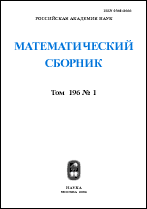|
This article is cited in 4 scientific papers (total in 4 papers)
Divergence everywhere of the Fourier series of continuous functions of several variables
A. N. Bakhvalov
M. V. Lomonosov Moscow State University
Abstract:
The Fourier series of a function $f$ of $n$ real variables is said to be
$\lambda$-convergent at a point $\vec x$ for $\lambda \geqslant 1$ if there exists the limit
$$
\lim _{\min \limits _kM_k\to +\infty}S_{\vec M}(\vec x,f)
$$
over all indices $\vec M=(M_1,\dots ,M_n)$ such that $1/\lambda \leqslant M_k/M_j\leqslant \lambda$ for all $k$ and $j$. An example of a continuous function of $2m$ variables with modulus of continuity
$$
\omega (F,\delta )=\underset {\delta\to +0}O\Bigl (\ln ^{-m}\frac 1\delta \Bigr)
$$
is constructed such that the Fourier series of $F$ with respect to the trigonometric system $\lambda$-diverges everywhere for an arbitrary fixed $\lambda >1$.
Received: 14.11.1996
Citation:
A. N. Bakhvalov, “Divergence everywhere of the Fourier series of continuous functions of several variables”, Sb. Math., 188:8 (1997), 1153–1170
Linking options:
https://www.mathnet.ru/eng/sm240https://doi.org/10.1070/SM1997v188n08ABEH000240 https://www.mathnet.ru/eng/sm/v188/i8/p45
|


| Statistics & downloads: |
| Abstract page: | 476 | | Russian version PDF: | 226 | | English version PDF: | 37 | | References: | 71 | | First page: | 1 |
|




 Contact us:
Contact us: Terms of Use
Terms of Use
 Registration to the website
Registration to the website Logotypes
Logotypes








 Citation in format
Citation in format 
